Projects that Make A Difference


About
Her Work
Daffney’s leadership and dedication to improving the quality of life for underserved communities throughout the St. Louis region are reflected in her civic commitment and involvement with professional organizations.
The Work
That Changes Communities
As part of the Build Back Better Regional Challenge Grant, Daffney was project lead for the City of St. Louis to ensure equitable inclusion and helped to secure the $25 million grant for the St. Louis to converge the region’s three leading industry clusters of biosciences, geospatial, and advanced manufacturing. She worked with regional partners, community leaders, and organizations to identify key areas for investment and development to tackle ongoing distressed neighborhoods and racial disparities, which were exacerbated during the Covid-19 pandemic. The coalition’s work helps to make the St. Louis globally competitive while equitably distributing the benefits of this economic growth to communities.
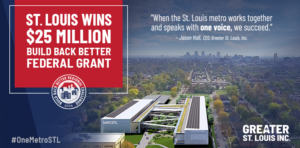
The Economic Justice Action Plan for St. Louis City was a groundbreaking initiative that aimed to address systemic economic inequalities and promote economic growth and sustainability for residents of the city. Daffney led the development of the Economic Justice Action Plan and moved the implementation of this plan into action.
Initially as the Chief Opportunity Zone Officer then later as Chief of Staff/ Vice President, Chief Administrative Officer for the St. Louis Development Corporation, Daffney spearheaded the Economic Justice Action Plan as a way to tackle some of the most pressing economic issues facing the City. She worked closely with community leaders, business owners, and policymakers to identify key areas where targeted interventions were needed to empower, develop, and transform neighborhoods.
The plan was designed to promote economic growth and sustainability by addressing barriers to economic opportunity, including poverty, unemployment, and lack of access to attainable housing, food and business desserts, healthcare, and education. The plan also aimed to promote equitable economic development by supporting minority small businesses, workforce development, and investing in infrastructure.
To ensure the plan’s success, Daffney worked with stakeholders from across the city to develop specific goals, strategies, and metrics for measuring progress. She also coordinated with government agencies, nonprofit organizations, and private sector partners to secure funding and support for key initiatives. The plan has helped attract new investment in historically underserved neighborhoods.
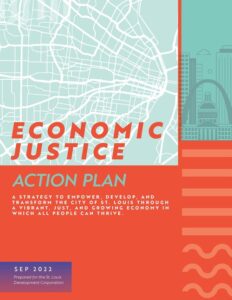
Through the Rockefeller Foundation Grant for Equitable Investment in Opportunity Zones (OZ), Daffney was hired as the Chief Opportunity Zone Officer for St. Louis Development Corporation to position St. Louis as a leader in utilizing Opportunity Zone investments to support equitable economic development with neighborhood-scaled projects. Daffney convened local stakeholders, including resident groups and community activists/organizers to create Opportunity Zone development and two working groups to safeguard equitable prospects for historically disinvested areas of St. Louis. Daffney and OZ staff hosted and participated in over 60 events, totaling 1,370 participants, to educate the community about Opportunity Zones.
Daffney worked with the EPA Office of Community Revitalization to provide technical assistance (through consultants Skeo and Council of Development Finance Agencies) to three pilot communities, including St. Louis, Missouri. The purpose of the technical support was to help develop community finance capacity to implement community sustainability, equity, and economic development goals. EPA and SLDC identified North Star Community Partners in North St. Louis along the Dr. Martin Luther King Corridor for technical assistance, identified geographic focus areas, key stakeholders, and provided related planning documents. A Work Plan and Situation Assessment was created for North Star Community Partners after the workshops.
St. Louis Opportunity Zone Grant Funds through Cities of Service established a beautification in the JVL and Greater Ville neighborhoods and community engagement through media outreach to educate the community on Opportunity Zones and their benefits. Media outreach profiled the city’s ten OZ clusters, innovation and current projects in OZ areas, resources, community engagement, businesses, and community/city partners.
The City of St. Louis updated the Opportunity Zone Prospectus to provide investors, developers, business owners, and citizens with a better understanding of the program and the opportunities the city has to offer within its designated Opportunity Zones. The prospectus highlights the St. Louis community, catalytic investments, St. Louis rankings, Envision Centers, Workforce & Talent Development, and is a marketing tool for investors seeking to invest in St. Louis.
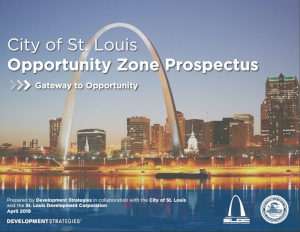
As a NewCities Urban Champion, Daffney Moore has been recognized for her exceptional work in advancing economic justice in St. Louis. In collaboration with NewCities, Daffney has been able to share her expertise and vision to help develop innovative solutions to the challenges faced by urban communities.
As a result of her work with NewCities, Daffney has been able to provide valuable insights and recommendations to local governments in the St. Louis region. She has helped to develop and implement policies and programs that promote economic opportunity and reduce inequality, including job training initiatives, community investment programs, and affordable housing initiatives.
Through her work as a NewCities Urban Champion, Daffney has helped to create a more equitable and prosperous St. Louis region. She continues to be a strong advocate for economic justice and is committed to building stronger, more inclusive communities that provide opportunities for all residents to succeed.
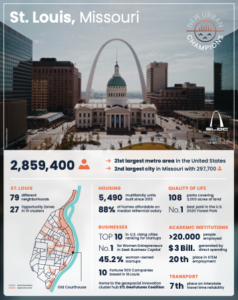
Daffney is also an expert in navigating government programs, such as the American Rescue Plan Act (ARPA) passed in 2021. As a seasoned project manager, Daffney was able to help SLDC secure $67 million in funding through the City of St. Louis ARPA funds to address pressing community needs. With her guidance, the SLDC was able to allocate resources to support small businesses, minority developers, and affordable housing initiatives for the City of St. Louis.
Daffney was instrumental in identifying areas of need within St. Louis City and worked closely with city officials to design programs that would provide targeted relief to those most affected by the pandemic. She was also responsible for overseeing the compliance team ensuring that funds were distributed effectively and efficiently for each program.
Through her work with ARPA, Daffney demonstrated her commitment to economic justice and community empowerment. Her expertise in navigating government programs proved invaluable to St. Louis City, allowing the city to provide much-needed support to its residents during a time of unprecedented challenge.

Daffney was a proud contributor to the book “Segregation by Design,” a powerful collection of essays exploring the history and ongoing impact of segregation in American cities. In her chapter, she highlighted the ways that systemic racism has shaped St. Louis and perpetuated inequality in housing, education, and economic opportunity.
Daffney’s contribution to “Segregation by Design” reflects her lifelong commitment to social justice and advocacy for marginalized communities. She believes that it is only by acknowledging the structural inequalities that underpin our society that we can begin to dismantle them and build a more just and equitable future.
Through her work with organizations like NewCities and the Build Back Better Regional Challenge Grant, Daffney continues to advocate for policies and initiatives that promote economic justice and support underserved communities. She remains an outspoken voice for change and a leader in the fight for a more equitable society.
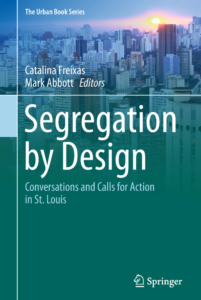
During Covid-19, Daffney worked on the taskforce to reopen the City of St. Louis. As a part of the Small Business Grant Committee, she helped to administer 1070 grants to small businesses totaling $5,350,000 million. Additionally, the St. Louis Opportunity Zone grant funds were used to provide personal protective equipment (PPE), to residents and small businesses to limit the spread of COVID-19.
The St. Louis Opportunity Zone COVID-19 Resource page was created to continue to engage the community, businesses, and investors in St. Louis. The page included resources with practical things businesses and residents could do and use to keep them safe. It also had support for training, grants, and other funding available for nonprofits and companies.

